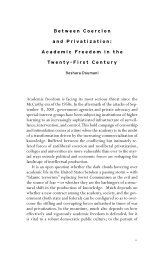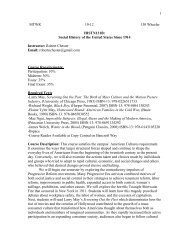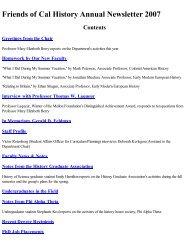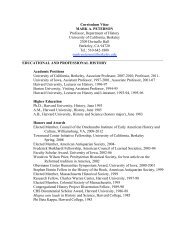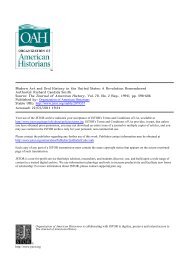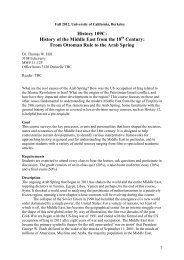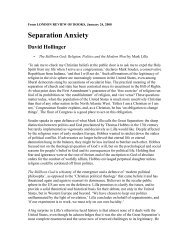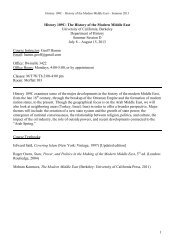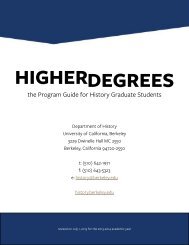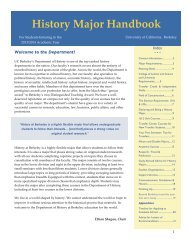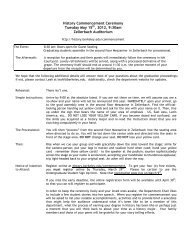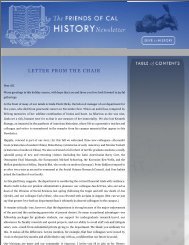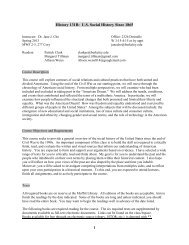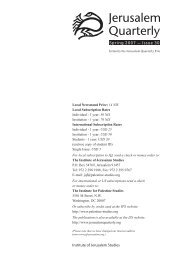David A. Hollinger | Amalgamation and Hypodescent: The Question ...
David A. Hollinger | Amalgamation and Hypodescent: The Question ...
David A. Hollinger | Amalgamation and Hypodescent: The Question ...
Create successful ePaper yourself
Turn your PDF publications into a flip-book with our unique Google optimized e-Paper software.
the census. This led Turner to reflect on the significance of uninhabited l<strong>and</strong>, which he declared to bethe fostering of the individualism <strong>and</strong> democracy that, he believed, had made the United States what itwas. <strong>The</strong> narrative of the frontier was keyed by the encounter of Europeans with a geographicalenvironment defined by the absence of people. Indians did not really count as people, as their l<strong>and</strong> wasuninhabited by Turner's definition. 75 Yet the narrative of amalgamation is antithetical: it is keyedinstead by the encounter of human beings with each other, across the lines of many communities ofdescent, in a series of intimacies <strong>and</strong> counter-intimacies fostered by a range of economic <strong>and</strong> culturalforces.Hence I invoke Turner not because his ideas are sufficiently alive today to dem<strong>and</strong> refutation, nor to 57suggest that amalgamation <strong>and</strong> hypodescent are strong enough concepts to perform the range of analytictasks Turner <strong>and</strong> his disciples asked the concept of the frontier to perform, but simply to underscore thedifference between Turner's historiographical era <strong>and</strong> ours. <strong>The</strong> narrative of the frontier was remarkablefor avoiding people <strong>and</strong> the specific terms of their action upon each other. <strong>The</strong> frontier thesis purportedto explain the course of American history without much attention to the slavery question, <strong>and</strong> Turnerboldly turned the tables on the Civil War–preoccupied historians of his day by explaining the end ofslavery as a function of the frontier, in the person of the man Turner called the greatest westerner of all,Abe Lincoln of Illinois. <strong>The</strong> frontier thesis was the most popular during exactly the years when the JimCrow system was the least contested, from the 1890s through the 1930s. <strong>The</strong> Turner thesis invited whitenortherners <strong>and</strong> white southerners to unite in thinking about America together, without being distractedby disagreements about black Americans. <strong>The</strong> most influential of the Jim Crow era's historians ofslavery, Ulrich B. Phillips, who is now remembered for the overbearing racism of his account, was adoctoral advisee of Turner's. Yet the narrative of amalgamation visible in the writings of manyhistorians of our own time 76 concentrates on the people <strong>and</strong> the relationships that Turner ignored, <strong>and</strong>on the behavioral <strong>and</strong> discursive answers Americans have offered to the question of ethnoracial mixtureduring the 110 years since he wrote.<strong>The</strong>se multiple answers, taken together, support the consensus of contemporary social science that 58the communities of descent sometimes called either racial or ethnic are highly contingent entities, withboundaries more subject to state power than was normally supposed by earlier generations, whosemembers were often blind to their own agency in creating <strong>and</strong> preserving these boundaries, taking asprimordial the stuff of history that they themselves had helped to make. Yet nothing in Americanhistory calls into question the truism that boundaries are necessary, or that the maintenance of anysolidarity requires exclusions as well as inclusions. And in an era of global dynamics, the challenge ofdrawing the "circle of the we" is more central than ever: where to try to draw what boundaries, withwhom, <strong>and</strong> around what? 77This issue is now prominent on the agendas of many societies around the world, especially in 59European nations increasingly populated by immigrants from Asia, the Middle East, <strong>and</strong> the Caribbean.<strong>The</strong> history of the United States is potentially instructive in this contemporary setting not because thisnation has drawn its social boundaries wisely or justly—far from it. It is beyond the scope of this essayto try to outline what the world might make of the American story of amalgamation <strong>and</strong> hypodescent.But I suspect that among the most important "lessons of American history," if that phrasing is not toostrong, is one as humbling as it is hopeful: the history of the United States shows that even a nationcarrying a heavy load of racism can incorporate individuals from an imposing variety of communitiesof descent on terms of considerable intimacy. <strong>The</strong> case of the United States implicitly refuses to letother nations off the hook that is presented to all immigrant-receiving democracies by the egalitarianideals for which Western Europe has been so vital a cradle.Among the Americans who have understood that European ideological heritage, especially as it 60came to the United States directly from Engl<strong>and</strong>, was Herman Melville. He was also a fierce prophet ofAmerica's role as an agent of the further development, if not the perfection, of English liberty. <strong>The</strong>long-term world-historical mission of the United States was to "forever extinguish the prejudices of



